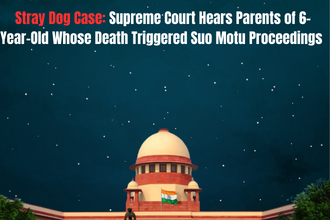The Supreme Court of India recently completed 75 years of existence—a milestone that calls for celebration and introspection. While the Court continues to function as the apex judicial body, concerns have mounted over its delayed handling of Constitution Bench matters, casting a shadow over its primary role as the final interpreter of the Indian Constitution.
What Are Constitution Benches?
As per Article 145(3) of the Constitution of India, a minimum of five judges must sit together to decide cases involving a substantial question of law relating to the interpretation of the Constitution. These benches, known as Constitution Benches, are pivotal in shaping constitutional jurisprudence in India.
The objective behind these benches, as discussed during the Constituent Assembly Debates on June 6, 1949, was to save judicial time and ensure that significant constitutional issues receive focused attention. References from three-judge benches to larger benches were meant to streamline the judicial process, not complicate it.
The Crisis of Pendency: 28 Constitution Bench Cases Await Listing
According to data from the Justice, Access and Lowering Delays in India (JALDI) initiative by the Vidhi Centre for Legal Policy, as of February 12, 2025, 28 Constitution Bench cases with 238 connected matters are pending. Even more startling is the average pendency—2,347 days, or 6.4 years, from the date of referral.
Shockingly, five cases have been pending for over 10 years, with the oldest pending for 25 years. This backlog raises concerns about judicial efficiency, accountability, and timely access to justice.
Sabarimala Review: Rights in Limbo
One glaring example is the Sabarimala review case, where the issue revolves around the ban on menstruating women entering the Sabarimala temple. Despite its critical intersection between Article 14 (equality before law) and Article 25 (freedom of religion), the matter remains unresolved. With *65 tagged matters, it holds the dubious distinction of being the most delayed Constitution Bench matter.
The delay in such landmark cases results in constitutional uncertainty and suspended rights, particularly impacting marginalized groups and fundamental freedoms.
Delays Turn Issues Into Academic Propositions
The delay in adjudicating Constitution Bench cases doesn’t just stall justice—it can make real-life constitutional crises seem academic in hindsight. Consider the case of electoral bonds, introduced in 2018 and challenged immediately. The Court only declared them unconstitutional in 2024, years after they had already distorted the electoral funding system.
Similarly, demonetisation and the abrogation of Article 370 were not timely addressed by Constitution Benches, leaving little room for judicial oversight or meaningful policy correction. These delays render constitutional interpretation ineffectual in real time, reducing the Court’s role to post-facto critique.
Judicial Roster and Lack of Objectivity
The Chief Justice of India (CJI) holds the power to constitute and list Constitution Benches, a process lacking any objective timeline or procedural transparency. This concentration of power can result in arbitrary delays, further burdening the judiciary and eroding public trust.
Legal scholars and policy analysts argue for the need to institutionalize objective criteria for listing Constitution Bench cases. A time-bound mechanism can ensure that substantial constitutional questions receive prompt attention, preserving the spirit of transformative constitutionalism.
Why Timely Adjudication Matters
- Protection of Fundamental Rights: Delays in constitutional interpretation create a chilling effect on rights. For example, citizens awaiting clarity on gender equality in religious practices (Sabarimala) or electoral transparency (electoral bonds) are left in a legal limbo.
- Preservation of Constitutional Morality: Timely decisions on matters like religious freedoms, social justice, and federalism ensure that constitutional morality prevails over majoritarian or political morality.
- Ensuring Government Accountability: In the absence of prompt judicial scrutiny, executive overreach goes unchecked, weakening democratic institutions.
- Promoting Legal Certainty: Businesses, civil society, and individual litigants require a predictable legal environment. Delayed rulings lead to uncertainty, policy paralysis, and economic implications.
The Way Forward: A Call for Structural Reform
To address the delay in Constitution Bench cases, the following measures are essential:
- Time-Bound Listing Protocol: Create a clear protocol mandating that any reference to a Constitution Bench be listed within a fixed time frame (e.g., 90-120 days).
- Permanent Constitution Bench: Establish a standing Constitution Bench that functions throughout the year, dedicated solely to constitutional interpretation.
- Judicial Infrastructure and Staffing: Increase the number of judges, provide administrative support, and implement case management systems to reduce delays.
- Transparent Roster Management: Publish the criteria and timelines for listing Constitution Bench matters, ensuring public accountability.
- Digital Tracking Tools: Enhance public access to data using real-time dashboards, similar to the Constitution Bench Tracker by Vidhi, to foster transparency and stakeholder participation.
Conclusion: It’s Time to Reclaim Constitutional Vision
As India celebrates 75 years of its apex court, the focus must shift from ceremonial milestones to structural reform. The inordinate delay in Constitution Bench cases undermines not just the Supreme Court’s credibility, but also the very fabric of constitutional democracy. If the judiciary is to remain the final arbiter of constitutional meaning, it must rise to the occasion, uphold the sanctity of rights, and act with urgency and purpose.


